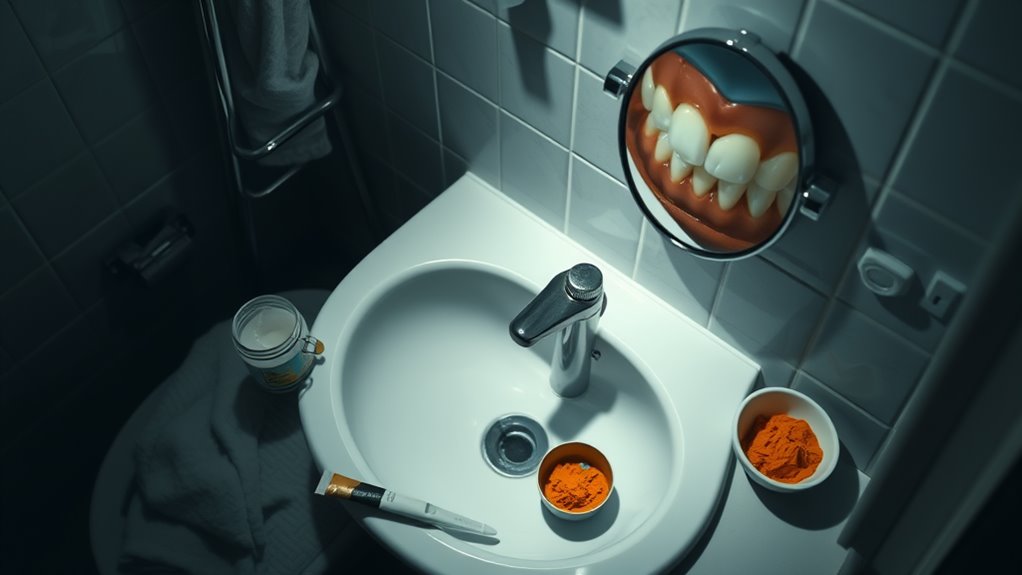Say Goodbye to Tooth Pain Overnight With This Home Remedy!
To say goodbye to tooth pain overnight, try a saltwater rinse or clove oil application. Mix one teaspoon of salt in warm water and swish it around your mouth to reduce inflammation. Alternatively, soak a cotton ball in clove oil and apply it directly to the aching area for quick relief. These kitchen remedies are easy to use and effective. Want to explore more home remedies? There are several other options that can help soothe your pain.
Understanding Tooth Pain: Causes and Symptoms
When you experience tooth pain, it can be a frustrating sign that something’s wrong. You might feel a sharp, shooting sensation or a dull ache that just won’t go away.
Often, tooth decay, gum disease, or a cracked tooth causes this discomfort. If you notice swelling or sensitivity when eating or drinking hot or cold items, these symptoms can indicate a deeper issue.
Ignoring tooth pain can lead to bigger problems, and it’s important to listen to what your body is telling you. By understanding the causes and symptoms, you’re taking the first step toward relief.
Essential Ingredients for Home Remedies
Home remedies for tooth pain often rely on a few essential ingredients that can provide effective relief right from your kitchen. You might be surprised that common items like salt, baking soda, and clove oil can be powerful allies.
Salt’s natural antiseptic properties can help reduce inflammation, while baking soda acts as a gentle exfoliant and neutralizes acidity. Clove oil, known for its numbing effect, can offer immediate comfort.
Don’t forget about warm water for soothing rinses or honey for its antibacterial qualities. By using these simple ingredients, you’re tapping into a sense of community wisdom shared by many who’ve faced tooth pain.
It’s all about finding comfort and relief with what you already have at home.
Remedy 1: Saltwater Rinse
One of the simplest and most effective remedies for tooth pain is a saltwater rinse. This natural solution not only reduces inflammation but also promotes healing by acting as a disinfectant. To prepare this rinse, mix a teaspoon of salt in warm water, swish it around your mouth for 30 seconds, then spit it out. You should do this a few times a day for relief.
| Step | Action |
|---|---|
| 1. Measure Salt | Take 1 teaspoon of salt |
| 2. Mix with Water | Combine with warm water |
| 3. Rinse | Swish, then spit out |
Remedy 2: Clove Oil Application
Applying clove oil can provide potent relief for tooth pain. This natural remedy is cherished by many as it contains eugenol, a compound known for its numbing effects.
To use it, simply soak a cotton ball with a few drops of clove oil and gently apply it directly to the aching tooth or gum. You’ll likely feel the pain subside within minutes, creating a sense of comfort and relief.
You might also want to mix it with a carrier oil, like olive oil, to reduce any irritation. Many people in your community swear by this remedy, making it a trusted go-to when discomfort strikes.
Embrace this simple solution and say goodbye to that nagging tooth pain!
Remedy 3: Garlic Paste
If you’re looking for another effective remedy, consider using garlic paste for tooth pain relief.
Garlic has natural antibacterial properties and can help reduce inflammation, which can provide quick comfort. To make the paste, simply crush a clove or two of fresh garlic and mix it with a pinch of salt.
Apply this paste directly to the painful area for about 30 minutes. You might feel a slight burning sensation, but don’t worry—this is normal and means it’s working!
You can repeat this process a few times a day until the pain subsides. Sharing this remedy with friends or family can also strengthen your bond, as you find comfort in effective home solutions together.
Remedy 4: Peppermint Tea Bag
Using a peppermint tea bag can be a soothing remedy for tooth pain.
Just brew a bag of peppermint tea and let it cool until it’s warm, but not too hot to handle.
Once it’s at a comfortable temperature, place the tea bag directly on the painful area of your gums or tooth.
The natural properties of peppermint can help numb the pain while giving you a refreshing sensation.
You’ll feel more relaxed and find comfort in knowing you’re using something simple and natural.
Plus, many people in your community swear by this trick, making it a great way to connect with others facing the same issue.
Give it a try, and say goodbye to that nagging pain!
Remedy 5: Apple Cider Vinegar
One potent home remedy you can try for tooth pain is apple cider vinegar. This natural solution not only helps alleviate discomfort but also offers a way to connect with others who value holistic approaches.
You can simply swish a diluted mixture of apple cider vinegar and water in your mouth for a few minutes to take advantage of its antibacterial properties. Many people in your community swear by it, forming a bond over shared experiences and effective solutions.
Just remember to rinse your mouth with water afterward to protect your enamel. It’s a simple remedy that makes you feel part of a supportive group, all seeking relief from tooth pain in natural, nurturing ways.
Step-by-Step Application Methods
To effectively use apple cider vinegar for tooth pain relief, follow these simple steps.
First, gather your materials: undiluted apple cider vinegar, a cotton ball, and a small bowl.
Pour a teaspoon of the vinegar into the bowl. Dip the cotton ball into the vinegar and gently squeeze out any excess.
Next, apply the cotton ball directly to the affected area. Hold it there for about 30 minutes, or as long as you can tolerate the sensation.
Afterward, rinse your mouth thoroughly with water to remove any residue.
Finally, repeat this process twice a day until you notice relief.
You’ll feel empowered knowing you’ve taken a natural approach to addressing your tooth pain. You belong to a community that values holistic remedies!
Important Precautions to Consider
Before trying apple cider vinegar as a remedy for tooth pain, it’s crucial to be aware of certain precautions.
First, always dilute the vinegar with water before applying it, as its acidity can erode tooth enamel if used straight. Also, limit your usage to occasional applications, so you won’t harm your teeth over time.
Pay attention to any allergic reactions or irritation in your mouth. If you have existing dental issues or sensitive gums, consult with a professional first. Remember, you want to feel better, not cause more problems!
Lastly, keep in mind that this remedy can offer temporary relief but isn’t a substitute for proper dental care.
You’re part of a community seeking natural solutions — let’s do it safely together!
When to Seek Professional Dental Care
While home remedies can provide temporary relief for tooth pain, knowing when to reach out for professional dental care is vital. If your pain lasts for more than a couple of days or becomes unbearable, it’s time to see a dentist.
You should also seek help if you notice swelling, fever, or an unpleasant taste in your mouth, as these can signal infection. Don’t ignore pain that worsens with pressure or hot and cold food.
Your oral health is crucial to your overall well-being, and you deserve a pain-free smile. Remember, you’re not alone in this journey—many people face similar issues, and getting professional help can make all the difference in your comfort and health.




